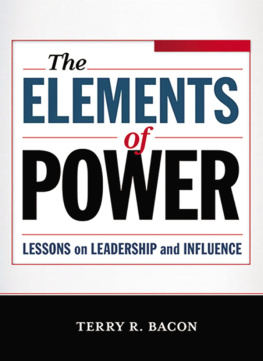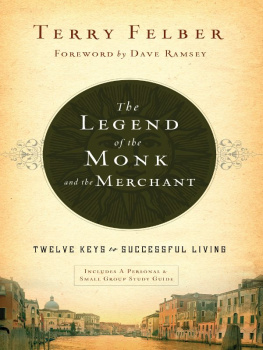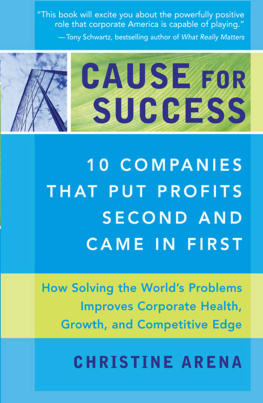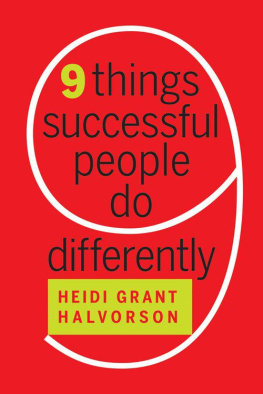 THE
THE 
BEHAVIORAL
ADVANTAGE
 THE
THE 
BEHAVIORAL
ADVANTAGE
What the Smartest, Most Successful Companies
Do Differently to Win in the B2B Arena
TERRY R. BACON
and
DAVID G. PUGH
Contents
Acknowledgments
Numerous people helped with this book in one way or another. We wish to thank everyone whose generous contributions, ideas, reviews, reflections, and plain hard work led to this book. First, we wish to thank the many professionals at Lore International Institute and Heidrick & Struggles who offered their expertise, shared their thoughts, assisted in our research, or were otherwise supportive through a process that would have been arduous and demanding had it not been for their encouragement and good cheer. From Lore, they include Allison Andersen, Andrea Seid, Anna Pool, Barb Singer, Becky Yeager, Bruce Spining, Chesney Frazier, Dan Osby, Darnell Place-Wise, De-Neil Peterson, Don Scott, Eric Baker, Greg Elkins, Jan Maxedon, Jana Freeburn, Jennifer Myers, Joey Maceyak, Joy Bartel, Kathy Uroda, Linda Simmons, Mark Arnold, Martin Moller, Matthew Zick, Nancy Atwood, Sean Darnall, Sharon Hubbs, Terryl Leroux, Torrey Tye, Trish Gyland, Val Evensen, and Wendy Ludgewait. From Heidrick & Struggles, they include Tom Friel, Joie Gregor, Jocelyn Dehnert, Gerry Roche, John Gardner, Andy Talkington, Richard Eidinger, Carol Emmott, Linda Heagy, Caroline Ballantine, Bonnie Gwin, Rene Fernandez, Rafael Mora, Eduardo Antunovic, Emeric Lepoutre, among our other partners and friends at Heidrick & Struggles.
We would especially like to thank the following people:
 Jeremy Silman, an extraordinary author of many fine books on chess. He was gracious in allowing us to quote liberally from his works.
Jeremy Silman, an extraordinary author of many fine books on chess. He was gracious in allowing us to quote liberally from his works.
 Ron Curry, another chess master, teacher, and author, who also allowed us to quote extensively from his writings on chess.
Ron Curry, another chess master, teacher, and author, who also allowed us to quote extensively from his writings on chess.
 Meredith Ashby and Stephen Miles of Heidrick & Struggles. They interviewed a number of Heidrick & Struggles partners for this book and for our previous book on behavioral differentiation, Winning Behavior: What the Smartest, Most Successful Companies Do Differently . Among the partners they interviewed, and whom we have quoted in the book, are John Gardner, Michael Flagg, Kyung Yoon, and Emeric Lepoutre.
Meredith Ashby and Stephen Miles of Heidrick & Struggles. They interviewed a number of Heidrick & Struggles partners for this book and for our previous book on behavioral differentiation, Winning Behavior: What the Smartest, Most Successful Companies Do Differently . Among the partners they interviewed, and whom we have quoted in the book, are John Gardner, Michael Flagg, Kyung Yoon, and Emeric Lepoutre.
 Joanne Kincer and Jeffrey Neal, who were gracious in allowing us to quote them in the book.
Joanne Kincer and Jeffrey Neal, who were gracious in allowing us to quote them in the book.
 Dr. Laurie Voss and Dr. Pamela Wise, whose extensive research on companies that exemplify behavioral differentiation gave substance and validity to our ideas about companies that use behavior to differentiate themselves.
Dr. Laurie Voss and Dr. Pamela Wise, whose extensive research on companies that exemplify behavioral differentiation gave substance and validity to our ideas about companies that use behavior to differentiate themselves.
 Karen Spear, who has always been an extraordinary thought partner, reviewer, and critic and whose help was as invaluable on this book as it was on Winning Behavior .
Karen Spear, who has always been an extraordinary thought partner, reviewer, and critic and whose help was as invaluable on this book as it was on Winning Behavior .
We would also like to thank the hundreds of CEOs, purchasing directors, supply chain management executives, program or project managers, and other professionals in buying or selling organizations who participated in our research on purchasing, supply chain management, and behavioral differentiation in organizations. We cite by name in the book those who could be cited. However, some executives could not be quoted by name because of their organizations policies about such matters. We are profoundly grateful to all of them for their information and insights, and we wish to acknowledge their contributions, whether or not we are allowed to mention their names.
Special thanks as well to Dr. Lisa Ellram, professor of supply chain management at Arizona State University, who gave us considerable information about her field and allowed us to quote extensively from one of her major studies in the field; Paul Krauss, a retired director of McKinsey & Company, who offered some keen insights into behavioral differentiation; John Tarpey of Centex Construction Group, who has broken new ground for leadership and differentiating behavior in his industry; Don Traywick, whose many stories about winning and losing bids have always been enlightening; Deke Lincoln, who gave us a great story about the importance of behavior in next game; DeNeil Hogan Petersen, one of the best practitioners of endgame weve ever met; and Danny Hicks, whose story about pursuing a contract was extremely helpful.
As for our previous books, the incomparable Tom Fuhrmark created the artwork. Donna Williams managed the manuscript through its creation, secured permissions, tracked down quotations, and proofread the drafts. Sheri Ligtenberg also proofread the drafts and offered numerous suggestions for improvement. These fine people were instrumental in the completion of the book.
Finally, we would like to thank our editor, Ellen Kadin, of AMACOM. Ellen has been endlessly supportive, has a wonderful sense of humor, and had the good fortune to be born on the same day as Willie Mays, Rudolph Valentino, and Sigmund Freud. She has something in common with all three of them.
Introduction
In Winning Behavior: What the Smartest, Most Successful Companies Do Differently (AMACOM, 2003), we introduced the concept of behavioral differentiation. In our research on successful companies, we noted that the best-in-class companies had more than great products or services, a unique business model, and a wealth of talented employees; they also outbehaved their rivals and created a behavioral advantage for themselves in the markets they served. By outbehaving their rivals, we mean that their behavior toward customersand employeeswas significantly better than the norm for their industry.
They showed more care, respect, and commitment than their rivals did. They were more responsive to customers needs, including their unspoken and unrecognized needs. They devoted more time and attentionincluding senior executive time and attentionto customers. They established processes for ensuring that their customers were better treated at every touch point, and they created policies and procedures that empowered their employees to resolve problems faster, to think creatively with customers, to share ideas, and to go beyond the standard relationship building to create a level of candor, trust, and connectivity that results in de facto partnerships with customers.
In Winning Behavior , we explored why Southwest Airlines has consistently performed so much better than United Airlines, American Airlines, Continental, U.S. Airways, and the other majors. We asked why Kmart is in while Wal-Mart continues to thrive as a company. The answer wasnt merely that the superior performers had better business models, although this is nearly always true, or better leadership, or more luck, or lower prices. The answer was that the superior performers had found ways to behaviorally differentiate themselves and gain a strong competitive advantage through their behavior.












 THE
THE 

 Jeremy Silman, an extraordinary author of many fine books on chess. He was gracious in allowing us to quote liberally from his works.
Jeremy Silman, an extraordinary author of many fine books on chess. He was gracious in allowing us to quote liberally from his works.